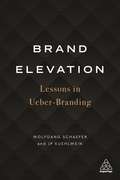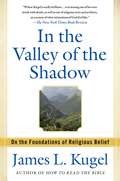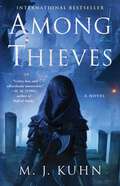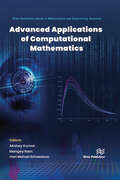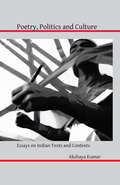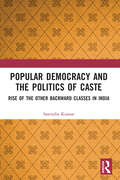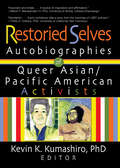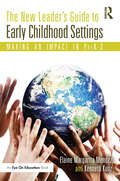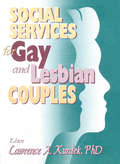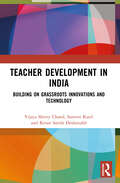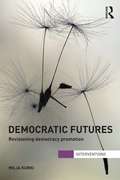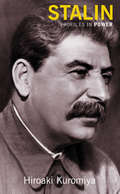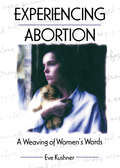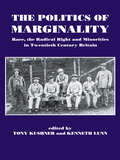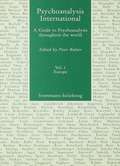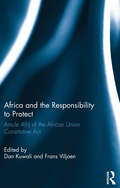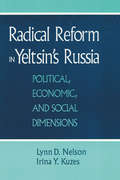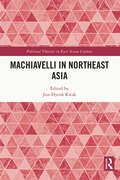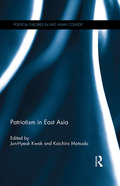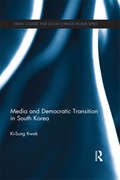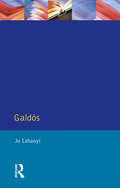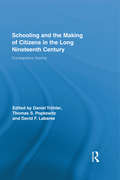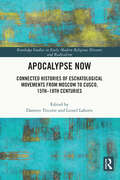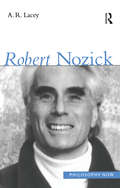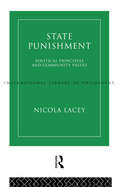Special Collections
Benetech’s Global Certified Accessible Titles
Description: Benetech’s GCA program is the first independent third-party EPUB certification to verify ebook accessibility. By creating content that is born accessible, publishers can meet the needs of all readers. Learn more: https://bornaccessible.benetech.org/
- Table View
- List View
Brand Elevation
by Wolfgang Schaefer and JP KuehlweinHow can a brand become one of those peerless 'Ueber-Brands' we all admire and are willing to pay a premium for? - Is there a proven process? - Where should we start?Brand Elevation explains the main drivers behind brands becoming peerless and priceless and how to harness these principles to develop a winning brand strategy. Written for marketers and brand managers of all levels of experience, and for both those working in start-ups and established players, it proposes a six-step, easy-to-follow program to elevate your brand.Brand Elevation explores challenges such as creating a distinct and brand-guiding mission, mediating between exclusivity and inclusion and mastering the art of seduction. Featuring case studies and expert accounts from organizations including Airbnb, Acqua di Parma, Burt's Bees, Lakrids, Starbucks, TerraCycle, and YouTube, Wolfgang Schaefer and JP Kuehlwein skilfully explain how any brand - regardless of sector and industry - can become a modern prestige brand.
In the Valley of the Shadow
by James L. KugelTEN YEARS AGO, Harvard professor James Kugel was diagnosed with an aggressive, likely fatal, form of cancer. "I was, of course, disturbed and worried. But the main change in my state of mind was that the background music had suddenly stopped--the music of daily life that's constantly going, the music of infinite time and possibilities. Now suddenly it was gone, replaced by nothing, just silence. There you are, one little person, sitting in the late summer sun, with only a few things left to do." Despite his illness, Kugel was intrigued by this new state of mind and especially the uncanny feeling of human smallness that came with it. There seemed to be something overwhelmingly true about it--and its starkness reminded him of certain themes and motifs he had encountered in his years of studying ancient religions. "This, I remember thinking, was something I should really look into further--if ever I got the chance." In the Valley of the Shadow is the result of that search. In this wide-ranging exploration of different aspects of religion--interspersed with his personal reflections on the course of his own illness--Kugel seeks to uncover what he calls "the starting point of religious consciousness," an ancient "sense of self" and a way of fitting into the world that is quite at odds with the usual one. He tracks these down in accounts written long ago of human meetings with gods and angels, anthropologists' descriptions of the lives of hunter-gatherers, the role of witchcraft in African societies, first-person narratives of religious conversions, as well as the experimental data assembled by contemporary neuroscientists and evolutionary biologists. Though this different sense of how we fit into the world has largely disappeared from our own societies, it can still come back to us as a fleeting state of mind, "when you are just sitting on some park bench somewhere; or at a wedding, while everyone else is dancing and jumping around; or else one day standing in your backyard, as the sun streams down through the trees . . . " Experienced in its fullness, this different way of seeing opens onto a stark, new landscape ordinarily hidden from human eyes. Kugel's look at the whole phenomenon of religious beliefs is a rigorously honest, sometimes skeptical, but ultimately deeply moving affirmation of faith in God. One of our generation's leading biblical scholars has created a powerful meditation on humanity's place in the world and all that matters most in our lives. Believers and doubters alike will be struck by its combination of objective scholarship and poetic insight, which makes for a single, beautifully crafted consideration of life's greatest mystery.
Among Thieves
by M. J. KuhnA thrilling fantasy debut—a high-stakes heist novel set in a gritty world of magic and malice, and perfect for fans of Six of Crows!
In just over a year’s time, Ryia Cautella has already earned herself a reputation as the quickest, deadliest blade in the dockside city of Carrowwick—not to mention the sharpest tongue. But Ryia Cautella is not her real name. For the past six years, a deadly secret has kept her in hiding, running from town to town, doing whatever it takes to stay one step ahead of the formidable Guildmaster—the sovereign ruler of the five kingdoms of Thamorr.
No matter how far or fast she travels, his servants never fail to track her down...but even the most powerful men can be defeated. Ryia’s path now leads directly into the heart of the Guildmaster’s stronghold, and against every instinct she has, it’s not a path she can walk alone. Forced to team up with a crew of assorted miscreants, smugglers, and thieves, Ryia must plan her next moves very carefully. If she succeeds, her freedom is won once and for all…but unfortunately for Ryia, her new allies are nearly as selfish as she is, and they all have plans of their own.
Advanced Applications of Computational Mathematics
by Mangey Ram and Akshay Kumar and Hari Mohan SrivastavaThis book “Advanced Applications of Computational Mathematics” covers multidisciplinary studies containing advanced research in the field of computational and applied mathematics. The book includes research methodology, techniques, applications, and algorithms. The book will be very useful to advanced students, researchers and practitioners who are involved in the areas of computational and applied mathematics and engineering.
Poetry, Politics and Culture
by Akshaya KumarThis book maps the journey of the Indian poetic imagination—in Hindi, Panjabi and Indian English—from its original quasi-spiritual longings to its activist interventions in the public domain. As Indian poetry of the post-1990s gravitates towards a non-Orientalised postcolonial nationalism, it seeks to rewrite and disseminate the shifting coordinates of nationalist imagination in terms of the dissent of the subaltern discontents of the nation. The book is interdisciplinary: it studies Indian poetry from the new emerging imperatives of postcolonialism, new historiography (subaltern, dalit and diasporas), nationalism, and cultural studies. Covering the two major north Indian languages—Hindi and Punjabi—along with poetry in Indian English, the book is a close textual study of about 150 poetry collections in these languages. It is path-breaking in its study of secular poetry written in the so-called vernaculars, with critical attention to its participation in the political as well as cultural processes of nation-making. This cutting-edge book should be of interest to scholars of Indian writings in English, Hindi and Panjabi, gender studies, dalit and diaspora studies, postcolonial poetry and to students reading South Asian literature and culture.
Popular Democracy and the Politics of Caste
by Satendra KumarThis book examines the intersection of caste and politics in North India and highlights its contribution to the anthropological study of democracy. It argues that the long-term process of internalization of democracy within the caste body has fundamentally changed the workings of the Indian party system. Drawing on an in-depth ethnographic case study of the Gujjars, a marginalized caste group in India, the book presents a systematic analysis of the political mobilization and culture of political participation of the Other Backward Classes to understand why and how certain caste groups have been more successful in politics than others. It discusses various key themes such as popular democracy and the politics of caste, regional politics and territoriality, myth, legends and heroes in the Gujjar community, the transition from lineage deities to caste deity, and the (re)formation of caste-community identity. It reveals the symbiotic relationships between religion and caste and shows how religion shapes contemporary caste. The book makes an important contribution to the study of marginalised groups and their politicization and fills a significant gap in the political sociology of India. It will be useful for scholars and researchers of sociology, history, exclusion studies, Dalit studies, political studies, history, social anthropology, and South Asian studies.
Restoried Selves
by Kevin KumashiroRestoried Selves: Autobiographies of Queer Asian / Pacific American Activists presents the first-person accounts of 20 activistslife stories that work against common stereotypes, shattering misconceptions and dispelling misinformation. These autobiographies challenge familial and cultural expectations and values that have traditionally forced queer Asian / Pacific Americans into silent shame because of their sexual orientation and/or ethnicity. Authors share not only their experiences growing up but also how those experiences led them to become social activists, speaking out against oppression. Many harmful untruthsor storiesabout queer Asian-Pacific Americans have been repeated so often, they are accepted as fact. Restoried Selves: Autobiographies of Queer Asian / Pacific American Activists provides a forum for voices often ignored in academic literature to re-story themselves, addressing a range of experiences that includes cultural differences and values, conflicts between different generations in a family or between different groups in a community, and difficulties and rewards of coming out. Those giving voice to their stories through narrative and other writing genres include the transgendered and intersexed, community activists, youths, and parents. The stories told in Restoried Selves: Autobiographies of Queer Asian / Pacific American Activists reflect on: personal experiencesbased on country of origin, educational background, religion, gender, and age populations served by activism, including the working poor, immigrants, adoptees, youth, women, and families different arenas of activism, including schools, governments, social services, and the Internet issues targeted by activism, including affirmative action, HIV/AIDS education, mental health, interracial relationships, and sexual violence institutions in need of change, including legal, religious, and educational entities and much more! Restoried Selves: Autobiographies of Queer Asian / Pacific American Activists is an essential read for academics and researchers working in Asian American studies, ethnic studies, gender studies, and queer studies, and for LGBTQ youth and their parents, teachers, and social service providers.
The New Leader's Guide to Early Childhood Settings
by Kenneth Kunz and Elaine Margarita MendezLearn how to effectively lead and make an impact in early childhood and primary school settings. The New Leader’s Guide to Early Childhood Settings explores how to empower educators and caregivers, advocate for early intervention, promote culturally responsive teaching, and confront common fears and hurdles. Packed with helpful resources and strategies, chapters feature key tips about effective communication, leveraging technology, and questions for reflection. Practical and accessible, this engaging guidebook delivers quick, effective advice whether you're just starting out or are an experienced leader newly jumping into the early years.
Social Services for Gay and Lesbian Couples
by Lawrence A KurdekHere is an essential resource filled with advice for providing social services to gay and lesbian couples. Despite myths to the contrary, many gay men and lesbians form long-term couples relationships. Unfortunately, many professionals working in the area of social services lack training with regard to the special needs of gay/lesbian couples. Social Services for Gay and Lesbian Couples helps fill this gap by providing information on diverse aspects of gay and lesbian domestic partnerships for social services workers.The contributing authors highlight the unique characteristics of gay and lesbian couples relationships and provide valuable information on the special social services these couples may need. Social Services for Gay and Lesbian Couples includes the results of a survey that divulge basic, descriptive information on the nature of gay and lesbian couples. These in-depth statistics reveal couples’perspectives on relationship length, commitment, and quality, terms of address for partners, finances, relationship experience, discrimination, living situation, sex, first meetings, support and challenges for the relationship, children, legal arrangements, and concerns about HIV and AIDS. In addition to revealing specific information about gay and lesbian couples, Social Services for Gay and Lesbian Couples also explores the therapeutic implications of this knowledge for social service providers. Chapters discuss specific situations in gay and lesbian relationships about which social workers should be informed, such as the factors involved in the formation of lesbian identities and issues encountered by gay couples when one partner is HIV-infected and the other is not. Also addressed are the special needs of gay or lesbian couples who wish to be parents, complete with descriptions of innovative services and the names, addresses, and phone numbers of national organizations that provide resources for gay or lesbian parents.
Teacher Development in India
by Vijaya Sherry Chand and Samvet Kuril and Ketan Satish DeshmukhThis volume shows how grassroots educational innovations and technology can be brought together in a fresh approach to human resource development in public social services. Based on a three-decade-long engagement with innovation in public education, this book provides an illustration of how teacher-driven innovations can be transformed into learning objects for technology-based professional development. It describes how innovations can be identified, screened and validated, and disseminated through two mechanisms—a clearinghouse-based approach and grassroots innovation “fairs.” It then demonstrates how these innovations can form the backbone of a “third space,” problem-based-learning curriculum, which can be delivered through a technology platform for large-scale professional development. The book offers guidance on practical ways of doing this, and on evaluating the curriculum’s impact, with case studies of programmes that covered thousands of teachers. This book will be of interest to teachers, students and professionals in education, teacher education, digital education, information technology, communication and media studies. It will also be useful to educationists, policymakers, teacher educators, educational institutions, online education centres, and practitioners involved in professional development, education and training in developing countries.
Democratic Futures
by Milja KurkiDemocracy promotion has been an influential policy agenda in many Western states and international organisations, and amongst many NGO actors. But what kinds of models of democracy do democracy promoters promote? This book examines in detail the conceptual orders that underpin democracy support activity, and the conceptions of democracy that democracy promoters, consciously or inadvertently, work with. Such an examination is not only timely but much-needed in today’s context of multiple democratic and financial crises. Contestation over democracy’s meaning is returning, but how is this contestation reflected, if at all, in democracy promotion policies and practices? Seeking to open up debate on multiple models of democracy, this text provides the reader not only with the outlines of various possible politico-economic models of democracy, but also with a close empirical engagement with democracy promoters’ discourses and practices. Drawing on a broad spectrum of examples, it exposes the challenges faced by Western governments in trying to reshape the political and economic landscape across the world and tentatively advances a set of concrete policy provocations which may enable a more pluralist and flexible democracy promotion practice to emerge. This innovative new work will be essential reading for all students of democratisation, democracy promotion and international relations.
Stalin
by Hiroaki KuromiyaThis profile looks at how Stalin, despite being regarded as intellectually inferior by his rivals, managed to rise to power and rule the largest country in the world, achievieving divine-like status as a dictator. Through recently uncovered research material and Stalin’s archives in Moscow, Kuromiya analyzes how and why Stalin was a rare, even unique, politician who literally lived by politics alone. He analyses how Stalin understood psychology campaigns well and how he used this understanding in his political reign and terror. Kuromiya provides a convincing, concise and up-to-date analysis of Stalin’s political life.
Experiencing Abortion
by Eve KushnerIf you&’ve had an abortion and are feeling isolated and vulnerable, Experiencing Abortion will remind you that you are not alone and that you must feel your emotions in order to accept your choice and heal. Each woman responds to abortion in her own way, yet, as this sensitive, insightful book shows, there are many similarities among women&’s post-abortion emotions. Sharing in the firsthand, personal experiences of other women who speak for themselves in this book will help you come to terms with anguish, stress, grief, anger, or any other overwhelming emotions you might be feeling. Don&’t go on ignoring or blocking out your feelings. Learn to incorporate your experience into your sense of self in a healthy way.By reading Experiencing Abortion, you will learn about the multiple feelings and reactions abortion can trigger, the process of accepting an abortion, and the struggle to control fertility without treating your body as an enemy. Offering you a safe, honest, and supportive environment in which to explore your feelings about your abortion, this book discusses many important topics, including: the way moods can overtake you after abortion how avoiding your experience can defer acceptance, which in turn leads to denial and guilt how pregnancy, abortion, and subsequent bleeding can affect your perception of your body the struggle to enjoy sex after your abortion your heightened awareness of gender after an abortion how your intimate relationships may change after an abortion the psychological reasons you may sometimes forgo birth control accepting yourself after a second abortionExperiencing Abortion will help women who have had an abortion understand that it is a complex physical and emotional experience that doesn&’t necessarily end after a week or a month or a year. It will also help professionals in abortion facilities and therapists who offer pre- and post-abortion counseling understand how abortion affects each individual differently and how they might help women work through their feelings both before and after abortion. Partners, friends, and families will find this book helpful and informative as they try to help their loved one get through this sometimes difficult, even traumatic, experience.
The Politics of Marginality
by Tony Kushner and Kenneth LunnImmigration to Britain has rarely achieved the levels experienced by the US, but it is nevertheless true of all periods that immigrants, refugees and soujourners have been continually present'. While we may have the beginnings of a history of immigration, ethnicity and race in Britain, there is a lack of historiographical awareness in the subject. The essays in this collection, ranging from specific case studies to broad themes, are an attempt to provide a basis for future discussion.
Psychoanalysis International, V.1
by Peter KutterIt is well known that the cradle of psychoanalysis was in Vienna, the scene of Sigmund Freud's activities at the beginning of the century. But how and when did psychoanalysis reach the other countries of Europe? What development did it undergo there? How did the different mentalities, political and cultural backgrounds as well as the personal particularities of its respective advocates affect psychoanalysis? What was its position in the past and what is its position today? These and other questions on the varied development and the present situation of psychoanalysis in the countries of eastern and western Europe are investigated by renowned psychoanalysts drawing on the experience and knowledge acquired in their own work. The result is a new conpendium on psychoanalysis in Europe containing all up-to-date information. Informative and instructive, at times as exciting as a detective story, Psychoanalysis International will possibly be of interest even to non-analysts.
Africa and the Responsibility to Protect
by Dan Kuwali and Frans ViljoenSituations of serious or massive violations of human rights are no longer purely of domestic concern, and sovereignty can no longer be an absolute shield for repressive governments in such circumstances. Based on this realization, the international community has recognized a responsibility to protect individuals in states where their governments are unable or unwilling to provide protection against the most serious violations. However, so far, only one intergovernmental organization, the African Union (AU), has explicitly made the right to intervene in a Member State part of its foundational text in Article 4(h) of its Constitutive Act. Although there have been cases of Article 4(h)-type interventions in Africa, the AU Assembly has not yet invoked Article 4(h) explicitly. This book brings together experts in the field to explore the potential application of Article 4(h), and the complexities that may explain its non-invocation so far. Although Article 4(h) is noble in purpose, its implementation faces several legal and policy challenges given that the use of force penetrates the principles of state sovereignty and non-intervention – the very cornerstones upon which the AU is founded. This book considers these issues, as well as the need to reconcile Article 4(h), in so far as it allows the AU to exercise military intervention to protect populations at risk of mass atrocities, with the provisions of the Charter of the United Nations. Drawing from the insights of law, political science, diplomacy and military strategy, the book offers a unique combination of multi-disciplinary expertise that harnesses the views of a diverse group of authors, focused on the legal, policy, and practical insights on the implementation of Article 4(h) and the responsibility to protect in Africa in order to provide concrete recommendations on how to end mass atrocities on the continent
Radical Reform in Yeltsin's Russia
by Julie Nelson and Irina Y. KuzesThis work examines the political and organizational factors that have shaped Russian economic reforms since the demise of the Soviet Union. The author draws on a variety of sources - including interviews conducted in Ekaterinburg, Voronezh and Smolensk - to present a multilayered portrait of the successes, failures and umintended consequences of the reforms. The book covers: the consequence of dissolving the USSR and Russia's role in the CIS; political transition; economic reform; assessment of the political and social implications of neo-liberal moneterism and of the voucher privatisation programme; and both regional and federal structures and processes.
Machiavelli in Northeast Asia
by Jun-Hyeok KwakAnalyzing the multifaceted receptions of Machiavelli from early modernity to the present history of Northeast Asia, this book explores a better East-West dialogue through which Machiavelli’s political philosophy can be appropriated properly in Northeast Asian practices. First, comparing the receptions of Machiavelli in Europe with the early introduction of his texts in Northeast Asia, it investigates what has been missing from the reception of his ideas in Northeast Asia. Second, examining the imperative issues which haven’t been construed appropriately even in recent reinterpretations of Machiavelli’s political philosophy in Northeast Asia, it searches for a direction of East-West dialogue through which Machiavelli’s political philosophy is not inordinately contextualized within the sociopolitical demands of Northeast Asian societies in accordance with time and place. Third, given the continuing interest in Machiavelli’s political realism, it examines the different conjunctions of his political realism with diverse traditional and contemporary political thinking in Northeast Asia. This book will be attractive to scholars in political philosophy, history, political theory, comparative philosophy, and area studies focused on East Asia, as well as scholars working in the field of comparative literature.
Patriotism in East Asia
by Jun-Hyeok Kwak and Koichiro MatsudaCurrent territorial disputes between the Northeast Asian countries have stimulated a resurgence of bellicose nationalism, and threaten to upset recent efforts to achieve regional cooperation and economic integration in East Asia. Alongside this, debates over pre-1945 Japanese wartime atrocities, aggravated by still unresolved territorial disputes between Japan and its neighbours have triggered diplomatic conflicts in Japanese-South Korean relations, virulent anti-Japanese protests in China, and a dramatic increase of right-wing nationalism in Japan. Many have perceived these phenomena as inevitable corollaries, inasmuch as they regard the Northeast Asian countries as historically homogeneous and nationalistic states, and have begun to question the feasibility of the post-Cold War efforts to replace nationalism with a moderate version of civic solidarity. This book contributes to the debates surrounding patriotism and nationalism in Northeast Asia, and investigates the feasibility of non-ethnocentric patriotism in countries across the region. In doing so, it highlights the differences between Asian and Western concepts of republican patriotism via theoretical discussions of the evolving discourses on nationalism, patriotism, democracy and civic solidarity. The chapters combine theoretical discussion with historical case studies such as modern state building in late Qing Dynasty; nineteenth century Japanese political thought; and the twentieth century Korean independence movement. In turn, the contributors explore the possibilities for republican patriotism in contemporary Northeast Asia, with a focus on the Chinese term minzu, and the possibilities it holds for an alternative configuration of national identity in the age of globalization; Maruyama Masao’s theories of nationalism in Japan; the National Security Law in South Korea, and the impact it has had on the country’s political culture; and the Taiwanese movement for self-governance. Patriotism in East Asia will appeal to students and scholars of Asian politics, political theory, Asian history and peace studies, as well as to those interested in issues of nationalism.
Media and Democratic Transition in South Korea
by Ki-Sung KwakSince South Korea achieved partial democracy in 1987, the country has moved away from authoritarian political control. However, after two decades of democratic transition, South Korea still does not have a strong liberal, individualist culture – something that has brought about a wide range of scholarly discussion on the nature of democracy practised in this dynamic country. While the political changes in South Korea have received rigorous attention from Western scholars, less attention has been given to the changing nature and role of media in this and other such transitions. This book focuses on the changing role of media in the more democratised political landscape of South Korea. It thereby contributes to debates about the emerging role of the media in democratic transition, especially in relation to approaches that go beyond traditional Western constructs of media freedom and the relationship between the state and the media. In addition, it discusses the complex interacting forces that affect the role of the media and their implications for state control and democratisation.
Galdos
by Jo LabanyiBenito Perez Galdos has been described as 'the greatest Spanish novelist since Cervantes.' His work constitutes a major contribution to the nineteenth-century novel, rivalling that of Dickens of Balzac and making him an essential candidate for any course on the fiction of the period. Jo Labanyi's study is supported by a wide-rangting introduction, a section of contemporary comment, headnotes to each piece and helpful appendix material.
Schooling and the Making of Citizens in the Long Nineteenth Century
by David F. Labaree and Thomas S. Popkewitz and Daniel TröhlerThis book is a comparative history that explores the social, cultural, and political formation of the modern nation through the construction of public schooling. It asks how modern school systems arose in a variety of different republics and non-republics across four continents during the period from the late eighteenth century to the early twentieth century. The authors begin with the republican preoccupation with civic virtue – the need to overcome self-interest in order to take up the common interest – which requires a form of education that can produce individuals who are capable of self-guided rational action for the public good. They then ask how these educational preoccupations led to the emergence of modern school systems in a disparate array of national contexts, even those that were not republican. By examining historical changes in republicanism across time and space, the authors explore central epistemologies that connect the modern individual to community and citizenship through the medium of schooling. Ideas of the individual were reformulated in the nineteenth century in reaction to new ideas about justice, social order, and progress, and the organization and pedagogy of the school turned these changes into a way to transform the self into the citizen.
Apocalypse Now
by Lionel Laborie and Damien TricoireEschatology played a central role in both politics and society throughout the early modern period. It inspired people to strive for social and political change, including sometimes by violent means, and prompted in return strong reactions against their religious activism. From the fifteenth to the eighteenth century, numerous apocalyptical and messianic movements came to the fore across Eurasia and North Africa, raising questions about possible interconnections. Why were eschatological movements so pervasive in early modern times? This volume provides some answers to this question by exploring the interconnected histories of confessions and religions from Moscow to Cusco. It offers a broad picture of Christian and, to a lesser extent, Jewish and Islamic eschatological movements from the fifteenth to the eighteenth century, thereby bridging important and long-standing gaps in the historiography. Apocalypse Now will appeal to both researchers and students of the history of early modern religion and politics in the Christian, Jewish and Islamic worlds. By exploring connections between numerous eschatological movements, it gives a fresh insight into one of the most promising fields of European and global history.
Robert Nozick
by Alan LaceyAlthough best known for the hugely influential Anarchy, State and Utopia, Robert Nozick (1938-2002) eschewed the label 'political philosopher' because the vast majority of his writings and attention have focused on other areas. Indeed the breadth of Nozick's work is perhaps greater than that of any other contemporary philosopher. This book is the first to give full and proper discussion of Nozick's philosophy as a whole, including his influential work on the theory of knowledge, his notion of 'tracking the truth', his metaphysical writings on personal identity and free will, his evolutionary account of rationality, his varying treatments of Newcomb's paradox and his ideas on the meaning of life. Illuminating and informative, the book will be welcomed as an authoritative guide to Nozick's philosophical thinking.
State Punishment
by Nicola LaceyNicola Lacey presents a new approach to the question of the moral justification of punishment by the State. She focuses on the theory of punishments in context of other political questions, such as the nature of political obligation and the function and scope of criminal law. Arguing that no convincing set of justifying reasons has so far been produced, she puts forward a theory of punishments which places the values of the community at its centre.
